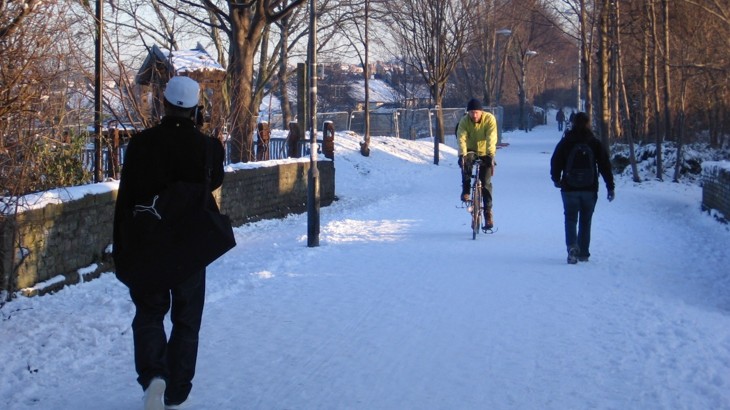Here are our top tips on how to stay happy and safe on your bike when cycling during the cold and icy winter months.

A jacket and a pair of gloves should be numbers one and two on your checklist.
Be seen
Day or night, if you’re not sure if it’s dark enough for lights, it’s always best to put them on.
Which route to take
Reconsider your route. Quiet roads that are good to ride on in fair weather are more prone to freezing, particularly early in the morning and bends can be very difficult if icy.
Sometimes a gritted busier road is better than an icy quiet road.

Find a route on the National Cycle Network
What not to wear
A jacket and a pair of gloves should be numbers one and two on your checklist. You may also want to consider wearing a helmet in treacherous conditions.
Your jacket needs to be water and windproof, but also breathable and not too thick. It's amazing how quickly you can overheat while cycling, even on the coldest days, and you can always add extra layers underneath if necessary.
With shorter days, it's also worth thinking about wearing something bright or reflective, to help others see you coming.
Get your bike serviced
Bikes tend to deteriorate more quickly in the winter months with things becoming loose easily in the wet.
To make sure your bike is in tip-top shape get it serviced at a local bike shop to prevent any nasty surprises during your ride.

After riding in bad weather it's a good idea to give your bike five minutes of TLC to keep things running smoothly.
Keep your bike in tip-top condition
Water (particularly mixed with road salt) is really tough on your bike.
After riding in bad weather it's a good idea to give your bike five minutes of TLC to keep things running smoothly.
First, give it a general rinse and wipe-down to remove dirt, salt and grit.
Pay particular attention to the chain, gears, brakes and wheel rims.
When you're done, dry it off with an old towel. Disperse any excess water in moving parts with a spray of WD40, GT85 or something similar then add some bike oil to the chain and gear mechanism.
Get a grip
A good set of tyres will go a long way to prevent unnecessary skidding and they will also lessen the likelihood of you having to fix a puncture in the sleet and rain.
Inflating the tyres a little less than you would in summer will improve traction in slippery conditions.
Pedal with care
Pedals get slippery in the wet too. If you’re not comfortable with clip-in pedals, invest in some with extra grip.
They’re pretty easy to fit or your local bike shop can give you a hand.
Riding tips
- Start slowly so that your body, especially your joints and muscles, can warm up properly.
- Leave extra time to cycle slower in wet and snowy conditions.
- When riding on settled snow, brake often to clear rims. Braking is up to six times longer when rims are wet.
- Avoid puddles that may hide potholes or other road hazards.
- Many surfaces are slippery in the wet, like tram tracks, painted lines, metal bridges and road plates - try to avoid these as much as possible or cross them with caution.
- Be aware of metal surfaces such as tram tracks and road plates which can be icy when other road surfaces are not.
- If you encounter ice, steer straight, don't pedal, and try not to brake as this could cause you to skid and fall.
- It can be hard for motorists to spot cyclists at the best of times, so take extra care when cycling in dark conditions.
If you are heading out on a ride in winter conditions, be sure to take extra care and don't put yourself at risk.
Sign up to our monthly enewsletter for more tips and how-to content.







